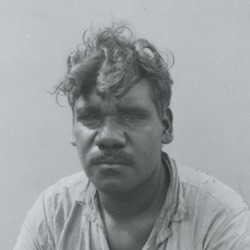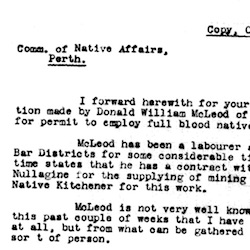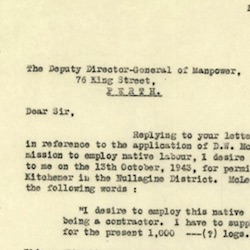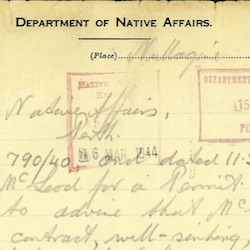Snowy Jittermarra recalls the resentment felt by marrngu over the way they were turned out of the stations during the slack period, in just the same way that horses were turned out into a paddock. These and other grievances were discussed with McLeod.
Snowy Jittermarra, Looking For A Way
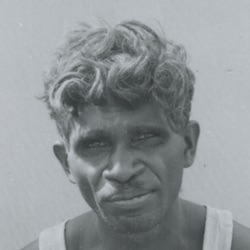
I just growing up now, and all the old people bin make up their mind, ‘How we going to help ourself do the–, can't see’m self nobody, no help from the white fella’. They say to themselves, ‘O, why don't we talk about something?’ They start to wait for everybody, we start talk about something. Anyhow they did talk about what to do. We're working, everybody working, and nothing - they know something about money now, they’re learning. Alright, some working ten bob a week, and some working two bob, five bob, keep going like that. When they going for a holiday they give them all the silver, five bob, fifty cents, five bob or two bob, plenty two bob, plenty five bob. And when we going for [pingkayi], when we going from the stations for a holiday now they turn him out, turn us down just like a horse, when we take the shoe turn him put him all in the good paddock, and the same time we got to walk out from the station, walk back to Nullagine, or somewhere else. Lot of station like that, Roy Hill, between Roy Hill and Noreena station there’s a meeting ground there belong to everybody. We used to come to that meeting. Anyhow when the time come, sometime we might running late, well we see the policeman coming. ‘Hey, there's a policeman coming’. All the boys there, how many people belong to the Noreena or Bonney Downs, he sort them out, police got to sort them out. And when you ready to go, you better go in the time. Sometime we running late little bit, maybe just about another couple of weeks or three of four days or–, running little bit late. Well we see the policeman coming, push us back to the station. And we got to walk back, we got to walk out from the station, to some sort of place might Nullagine, from Noreena to Nullagine. We got to walk from there. When the policeman come well we got to walk back to station. And squatter was oh, happy, ‘Oh, you come back?’ Never say anything. Next day, never going to give us spell, just after we bin walk from Nullagine to Noreena and we got to start straight away. We might get there about afternoon, in the morning we going to start work, doesn't matter how tired. And that's the way we are.
Alright, all the old people put together, and mention about this Don McLeod. ‘Hey, Don McLeod is a good man. Can we try that man give him a talking up?’
‘Mmm, alright’.
My father was talking to everybody now, and we start. Some, two or three fellas bin working, my father's brothers, all the brothers anyhow, bin working with the Don McLeod, good well sinker, sinking well, all around Noreena boundary and Nullagine, they was making that– put up the windmill there. They keep talking. ‘Can you help us? No good we camping in the rubbish heap, we're camping in the river, when the rain come we got to run back to shearing shed, we got to camp amongst the sheep when it's shearing time, you know? We got to camp amongst the [sheep]. Some camp in the saddle room, some camp in the shearing shed, some old people they still in the river, putting some sort of iron or canvas, just enough to keep him bit dry but still they get wet through’.
Alright, all that problem now, we start working on that one now. Alright, and Don McLeod say, ‘By God, we're going to be in trouble’.
‘Oh well, we're all going to be in trouble, we'll help you and we'll stick together and help you’.
‘Alright’.
He did.
Citation
Audio: Snowy Jittermarra, recorded by Anne Scrimgeour, Warralong, 5 August 1993.
Photo: Board of Anthropological Research, South Australian Museum, AA346/4/22/1 Marble Bar R352.


